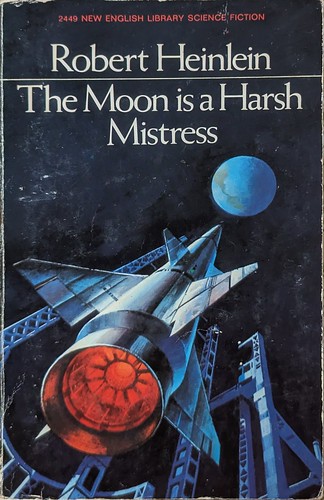 Read Wiki or Goodreads if you will; you'll get what you expect, I expect.
Read Wiki or Goodreads if you will; you'll get what you expect, I expect.As a space-opera type story it's good: poor oppressed ex-convicts revolt against evil bureaucratic oppressors to form the Free State of Luna, with the aid of a sentient computer. And as usual for RAH, there's the political philosophy: in this case, anarcho-capitalism (not Libertarianism, I think). He doesn't make any attempt to indicate why A-C is a good idea here, whereas limited-franchise democracy was a good idea in Starship Troopers. And by the end of the story we have a Congress elected by univeral suffrage with law making power, so I'm not really sure there's a lot of consistency in his thoughts.
The expounding-of-ideas is too irritatingly didactic, more Glory Road than ST. The vision of "law" that he presents us with, as being of the choose-your-own-judge sort, doesn't seem entirely plausible; and the narrator's insistence that there are no laws, just customs, is dishonest. We're presented with one example of law in action, where the right answer is achieved, but that does not convince.
I'm not sure why he felt the need to kill off the computer in the end; perhaps because it would have been left all to obviously in charge otherwise?
No comments:
Post a Comment